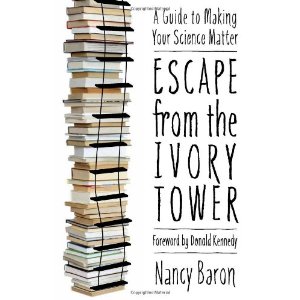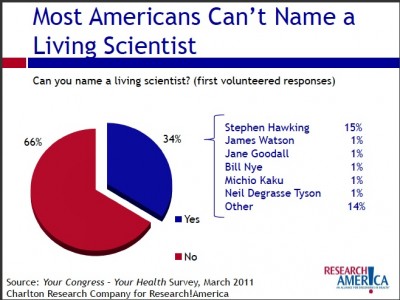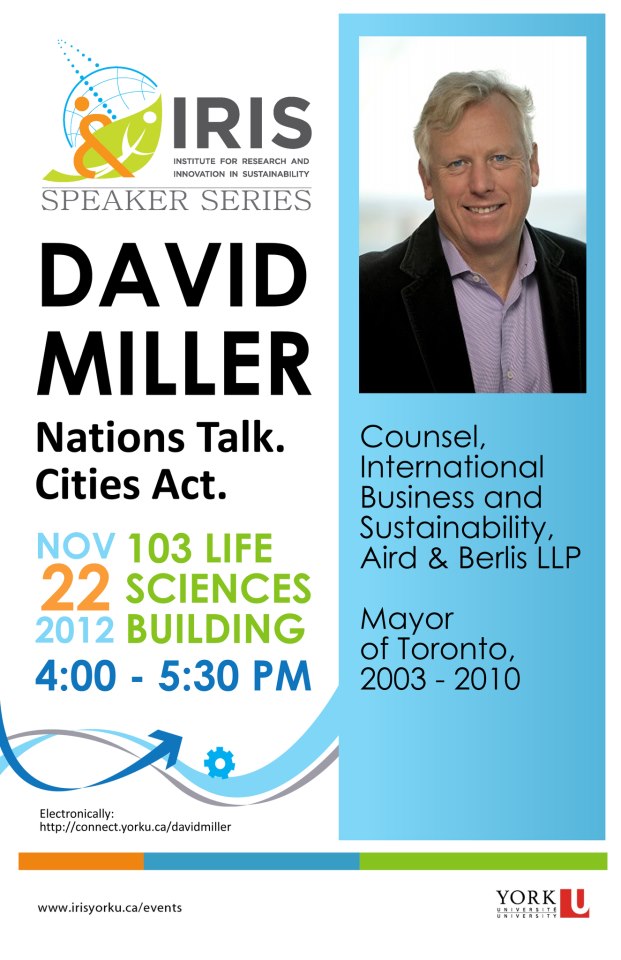Published October 24, 2012
by dbazely
In their 2000 book, The Cultural Creatives, Paul H. Ray and Sherry Ruth Anderson, two professors in the USA, examined common values that are held by people regardless of their political affiliation - democrat or republican. They generated a long list of shared characteristics that cut across partisan political boundaries, such as an interest in ecological sustainability, and respect for womens' rights.
One value that I hope most people would share across a broad-political spectrum, is that of using the best-available research to inform policy. I would also wager, that given the difference between the trends in Canadian and USA citizens' beliefs about whether climate change has a human cause, most Canadians would think that we'd be much more likely to find ideology-driven policy (this is basically policy that's driven by belief and values, even in the face of contradictory evidence, that suggests that the value-based policy may not serve society's broader interests), south of the 49th parallel.
 Ummm, so, the actual evidence appears to runs contrary this assumption. In an in-depth article for The Walrus in September 2012, and a more light-hearted Toronto Star article from August 2012 (if that's possible, given the seriousness of the topic), by self-described seniors, criminal defence lawyer Edward L. Greenspan, and criminologist, Professor Emeritus Anthony N. Doob challenge federal criminal justice policy that runs in direct opposition to research results. They wrote in the Toronto Star, that: "The minister of justice said he is not interested in evidence-based policy: “We’re not governing on the basis of the latest statistics,” he said. “We’re governing on the basis of what’s right to better protect victims and law-abiding Canadians.”"
Ummm, so, the actual evidence appears to runs contrary this assumption. In an in-depth article for The Walrus in September 2012, and a more light-hearted Toronto Star article from August 2012 (if that's possible, given the seriousness of the topic), by self-described seniors, criminal defence lawyer Edward L. Greenspan, and criminologist, Professor Emeritus Anthony N. Doob challenge federal criminal justice policy that runs in direct opposition to research results. They wrote in the Toronto Star, that: "The minister of justice said he is not interested in evidence-based policy: “We’re not governing on the basis of the latest statistics,” he said. “We’re governing on the basis of what’s right to better protect victims and law-abiding Canadians.”"
If crime has been declining since 1992 (so the stats say), then building more prisons to incarcerate more people, which the Harper government is pushing, just doesn't make good policy sense. But, aha, perhaps there's a profit-motive in here somewhere. So, if you are interested in learning more about what a profit-motive associated with higher levels of imprisonment could look like, then, in the spirit of NOT getting our information from verifiable, peer-reviewed sources that feed into the evidence-base of the policy pyramid, I can thoroughly recommend the Jailhouse Job episode, from the TV series, Leverage, starring Timothy Hutton.
Since the present Canadian justice minister is not interested in evidence-based policy, it seems pretty evident to me, that this value must, logically, hold across all branches of the federal government. You can't have one ministry rejecting the concept of "evidence-based" and another accepting it, can you? OK - maybe you can.... in a blog from 2011, Tobi Cohen explains exactly how this government achieves this multiple-personality approach.
So, what's a researcher, engaged in knowledge production to do, when confronted by all this rejection of tedious data? One option, is to go to a meeting where politicians are discussing the importance of research in policy development, and try to feel some love. This is exactly what I did last week at the Thornhill Federal Liberal Riding Association fundraiser event in Vaughn, Ontario, just north of Toronto.
A retired colleague, Prof Emeritus Ken Davey FRSC, Order of Canada, of York University's Biology Department, organized a panel consisting of provincial and federal members of parliament, including Dr. Ted Hsu, the Liberal MP for Kingston and the Islands. Dr. Hsu is a physicist, who went into business, and then into politics. He is the Liberal critic for science and technology, and has been one of the most active Canadian politicians in calling out the Harper government on their humungous cuts to science, including the closure of the Experimental Lakes Area. Incidentally, York University's Professor Norman Yan is speaking, today, on a panel at the University of Toronto, about the Experimental Lakes closure: Unmuzzled - The Urgent Need for the Vocal Aquatic Scientist in Today's Political Climate in Canada.
In his speech, Dr. Hsu explained the implications of cancelling the long-form census, the gutting of Environment Canada and Parks Canada, the muzzling of federal scientists, and of many other Harper government idealogically-motivated cuts to those parts of our federal government that deal in producing high quality data or the provision of expert review. Dr. Hsu also talked about his excitement at the Death of Evidence rally in Ottawa in July 2012, at which he was the only MP to address the crowd. He was delighted to see a group (namely, scientists), who don't normally engage in political actions, becoming active.
Well, yeh, I was aware of the demonstration, since a number of my colleagues organized it and many attended it - and, way to go, guys! Unfortunately, as a veteran demonstrator myself (taking my toddler to Queen's Park in the mid-1990s, to demonstrate against cuts to daycare, etc.), it's hard for me to see how this lab-coat protest is going to contribute towards bringing about a change in attitude on the part of the Harper government. The real work lies elsewhere. This rally was baby-step number zero.
In my opinion, one of the main reasons why Canadian science has been suffering so much at the hands of the current federal government, is that Canada has been a laggard when it comes to supporting and promoting the Public Understanding of Science. You only have to look to the United Kingdom, at science personalities like, now retired, Richard Dawkins, Charles Simonyi Professor of the Public Understanding of Science, Oxford University, and Jim Al-Khalili, the Professor of Public Engagement in Science at Surrey University, to see the boosted profile that basic science research has in society.
Both in the UK and the USA, there is much more organized advocacy for research. For example, while on sabbatical at Harvard, there was a call at the Forest, for a training opportunity to teach researchers how to speak to their congressman or congresswoman.
Are there strategic solutions to this Canadian gap in science engagement? Yesterday, the Science Media Centre of Canada, a non-profit charity, and the office of York's Vice-President for Research and Innovation, held a "journalism bootcamp" or Journalism 101 afternoon session for scientists to learn how to improve their interactions with the media. Members of a panel, Karen McCairley, an Executive Producer at Discovery Channel, Jim Handman, Senior Producer of CBC's Quirks and Quarks, Hannah Hoag, freelance science journalist and Penny Park, Executive Director of the Science Media Centre spelled out, in hilarious, and very plain language, how to be a more accessible scientist to the public and media.
I got to give a presentation, as a scientist, about why we (I'm looking at you in your lab coats and uncombed hair!) SHOULD communicate with the public about science, both directly and indirectly, instead of hiding in our labs., or in my case a ditch, or a forest. Here are my 5 main reasons:
1. The public are taxpayers, they fund you, and they deserve to hear directly from you (OK, so the Harper government doesn't want that, but other governments support this notion and have developed some great guidelines).
2. Outreach and engagement is increasingly written into funding requirements.
3. If the scientist doesn't communicate in plain language, someone else will do it for him/her.
4. Learning how to communicate in plain language can have the payoff, of enabling better interdisciplinary communication within academia, and increased research opportunities where large, interdisciplinary collaborations are required for funding.
5. To help Canada catch up with the UK and USA, which are ahead in encouraging the area of the public understanding of science.
At the bootcamp, Peter Calamai, a veteran Canadian science journalist and a founding member of the Canadian Science Writers' Association, reported some alarming statistics from the USA that underscored the importance of scientists communicating with our various publics. Most Americans cannot name a living scientist - 15% managed Stephen Hawking (the slide above is used with permission). This was reported in the March 2011 Research Amer!ca: Your Congress, Your Health, National Public Opinion Poll. Peter also recommended the book, Escape from the Ivory Tower by Nancy Baron, as a must-read for scientists.
In their book, Unscientific America - How scientific illiteracy threatens America, authors Chris Mooney and Sheril Kirschenbaum report that only 18% of Americans have actually met a scientist. Which prompted one blogger, at New Voices for Research to encourage scientists to head out into the street, shake a stranger's hand and introduce ourselves!
So, there are the marching orders for scientists living in Conservative-held Federal ridings across Canada - go forth and shake a lot of hands. That's what it is going to take to build voter-support for natural and physical sciences, social sciences academic research, and evidence-based policy, one hand-shake at a time.
Dawn Bazely
And PS - I talk to politicians of all stripes and people from all walks of life - this is a fundamental approach of sustainability - to be inclusive, and cut-across partisan politics. I believe that I just might be a Cultural Creative! Do the test for yourself, and find out whether you are one.
Posted in: Blogs | IRIS Director Blog



 Abstract: Ozone layer depletion due to man-made emissions, mostly chlorofluorocarbons (CFCs) and some bromine containing chemicals, have been recognized and addressed via the Montreal Protocol (MP). The successful phase out of ozone depleting substances, listed but not defined by the MP, led to the use of other chemicals that do not deplete the ozone layer. Hydrofluorocarbons (HFCs) were one such class of compounds that have found increasing use over the years. The Montreal protocol has been credited with helping the climate change issue by phasing out, CFCs, many of which are also powerful greenhouse gases. Many HFCs are also potent greenhouse gases and their increasing use can offset the benefits gained to date. Lastly, all chemicals that can deplete the ozone layer are not necessarily included in the MP and raise the question regarding inclusion of other chemicals in the protocol. A prime example is nitrous oxide, which we argue is the most important ozone depleting gas that is being emitted today. I will discuss the phase in of HFCs, in place of CFCs, and its impact on climate as well as the role of nitrous oxide as an ozone depleting gas. I will discuss the atmospheric science of these chemical as well as their implications to decision making.
Abstract: Ozone layer depletion due to man-made emissions, mostly chlorofluorocarbons (CFCs) and some bromine containing chemicals, have been recognized and addressed via the Montreal Protocol (MP). The successful phase out of ozone depleting substances, listed but not defined by the MP, led to the use of other chemicals that do not deplete the ozone layer. Hydrofluorocarbons (HFCs) were one such class of compounds that have found increasing use over the years. The Montreal protocol has been credited with helping the climate change issue by phasing out, CFCs, many of which are also powerful greenhouse gases. Many HFCs are also potent greenhouse gases and their increasing use can offset the benefits gained to date. Lastly, all chemicals that can deplete the ozone layer are not necessarily included in the MP and raise the question regarding inclusion of other chemicals in the protocol. A prime example is nitrous oxide, which we argue is the most important ozone depleting gas that is being emitted today. I will discuss the phase in of HFCs, in place of CFCs, and its impact on climate as well as the role of nitrous oxide as an ozone depleting gas. I will discuss the atmospheric science of these chemical as well as their implications to decision making.

